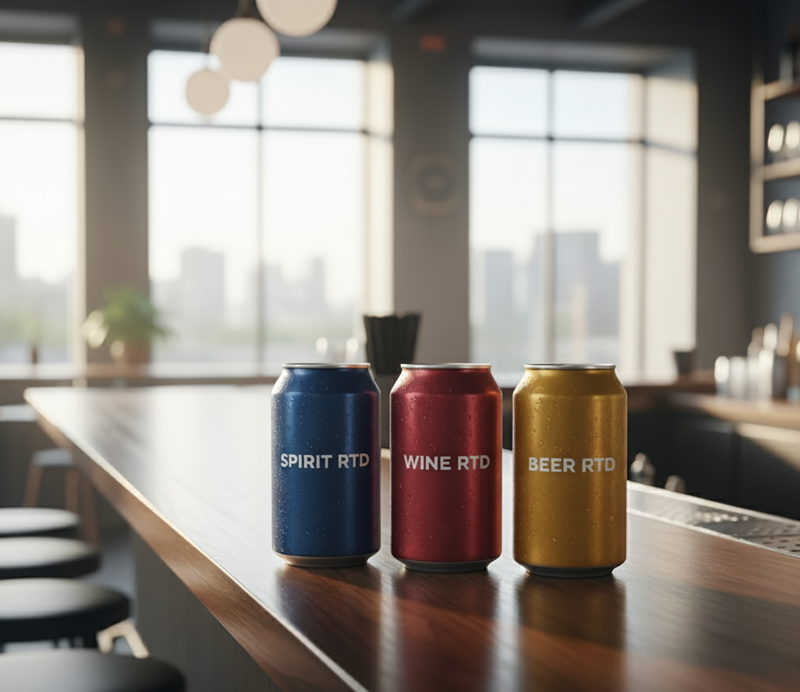Global RTD alcohol on track for 6% annual growth through 2032
Ready-to-drink alcohol reaches $24.2 billion
2025-09-05

The global market for alcoholic ready-to-drink (RTD) beverages showed strong growth and resilience in 2024, standing out as the only major segment in the beverage alcohol industry to post positive volume gains while the broader market contracted. RTDs, which include spirit-based cocktails like mojitos and gin and tonic, wine-based drinks such as spritz and sangria, and beer-based options like shandy and radler, are defined by their convenience and lower alcohol content, though some products have higher ABV.
In 2024, the RTD market reached an estimated value of $24.2 billion, according to a synthesis of multiple market data sources. This figure reflects a focused definition of alcoholic premixes and excludes non-alcoholic RTDs or broader flavored malt beverages that some other estimates may include. The category grew by 2% in volume while the total beverage alcohol market shrank by 1%. Value growth was even stronger at 6%, indicating that consumers are willing to pay more for premium products.
The main drivers behind this growth are convenience, health and wellness trends, and ongoing flavor innovation. Consumers are increasingly looking for portable, single-serve drinks that require no preparation. At the same time, there is rising demand for low-alcohol, low-calorie, and low-sugar options. Spirit-based RTDs now make up nearly half of the market, reflecting a shift toward more sophisticated, bar-quality experiences in a can or bottle.
Geographically, Asia-Pacific leads the global RTD market with a 37.3% share worth $9 billion in 2024. This region’s growth is fueled by rising incomes, urbanization, and changing social norms. North America remains a key center for innovation and trendsetting, especially with the popularity of hard seltzers and canned cocktails. Europe is also showing growth potential as convenience and wellness trends take hold. Emerging markets like Brazil and Mexico are expected to become important growth areas due to their young populations.
In terms of consumption, global RTD sales reached about 575 million nine-liter cases in 2024. The average price per case was around $42.09, which is higher than mainstream beer prices and reflects the premium positioning of many RTD products. Per capita consumption varies widely by country but remains a small share of total alcohol consumption even in mature markets like the United States, where RTDs account for about 10% of all alcohol consumed by volume among legal drinking age adults.
The demographic profile of RTD consumers skews young: people aged 18-25 account for over a third of all consumption globally. Older consumers over 55 make up just 16%. This youth focus creates both opportunities for long-term growth and challenges related to brand loyalty and the need for constant innovation.
Within the product mix, spirit-based RTDs have become dominant with a 47.8% global share in 2024. These products appeal to consumers seeking premium experiences with familiar spirits such as vodka or tequila. Flavored variants are especially popular, making up more than 70% of the market. Malt-based RTDs still play a role but are losing ground to spirit-based alternatives perceived as more authentic and higher quality. Wine-based RTDs remain a niche but are growing steadily among traditional wine drinkers looking for convenience.
Packaging trends show a split between bottles and cans. Bottles hold a majority share globally due to their premium image but cans dominate single-serve formats favored for outdoor events or on-the-go occasions. Off-trade retail channels—supermarkets, liquor stores, convenience stores—account for over two-thirds of all sales. Online retail is growing rapidly but still represents a smaller share overall.
International trade in alcoholic RTDs is shaped by established spirits-producing countries such as the Netherlands, Germany, the United Kingdom, the United States, and Mexico. These nations are major exporters thanks to their strong domestic spirits industries and established trade routes for base ingredients like tequila or whiskey. Trade flows are influenced by tariffs and regulatory differences; for example, U.S.-China trade tensions or potential EU tariffs on American whiskey can impact pricing and competitiveness.
On the production side, global ex-factory value (the value at producer level before retail markups) is estimated at $15.7 billion in 2024 after accounting for typical channel margins. Asia-Pacific is the largest production hub followed by North America and Europe.
The competitive landscape is dominated by large beverage companies from both beer and spirits backgrounds—Anheuser-Busch InBev, Diageo plc, Bacardi Limited, Suntory Holdings Limited, Constellation Brands, Brown-Forman—and increasingly features collaborations between alcohol producers and soft drink giants such as Bacardi’s partnership with Coca-Cola or Anheuser-Busch InBev’s collaboration with PepsiCo on new RTD launches.
Looking ahead through 2032, analysts expect continued robust growth with an average annual rate of about 6%. The market could exceed $40 billion in retail value by then if current trends continue. Spirit-based premiumization will likely drive much of this expansion as consumers seek higher quality experiences in convenient formats.
However, challenges remain: regulatory scrutiny on alcohol marketing may increase; supply chain disruptions could affect costs; and consumer fatigue from too many new brands or flavors could favor established players over newcomers.
Industry experts recommend that companies focus on developing premium spirit-based products using high-quality ingredients; integrate health-oriented features into new offerings; target specific consumer groups with tailored flavors; invest in omnichannel distribution including e-commerce; and prioritize expansion into high-growth developing markets where local adaptation will be key to success.
The alcoholic RTD sector’s performance in 2024 highlights its unique position as both an engine of growth within a struggling industry and a reflection of changing consumer preferences worldwide.
| More information |
|---|
| (PDF)Global RTD Beverage Market Analysis |
Founded in 2007, Vinetur® is a registered trademark of VGSC S.L. with a long history in the wine industry.
VGSC, S.L. with VAT number B70255591 is a spanish company legally registered in the Commercial Register of the city of Santiago de Compostela, with registration number: Bulletin 181, Reference 356049 in Volume 13, Page 107, Section 6, Sheet 45028, Entry 2.
Email: [email protected]
Headquarters and offices located in Vilagarcia de Arousa, Spain.